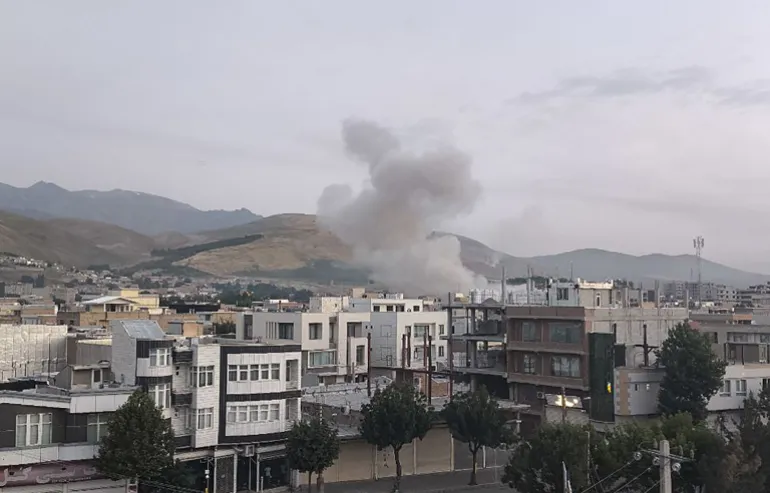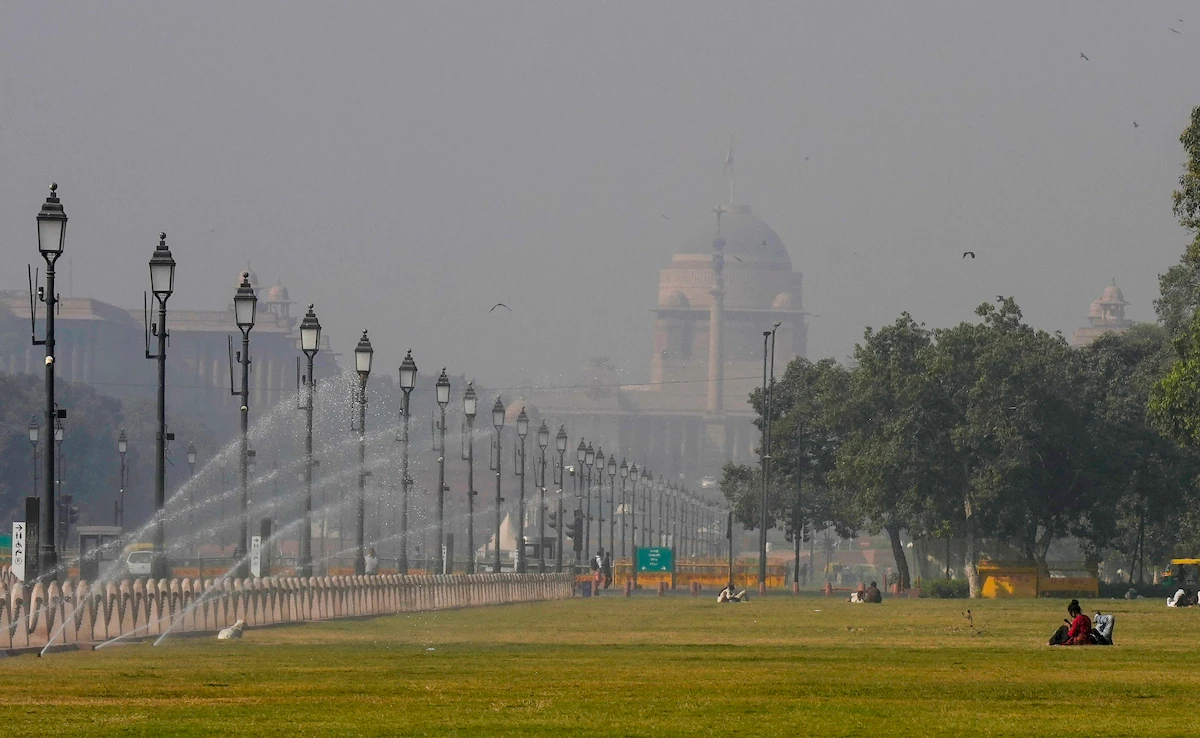- Courses
- GS Full Course 1 Year
- GS Full Course 2 Year
- GS Full Course 3 Year
- GS Full Course Till Selection
- Answer Alpha: Mains 2025 Mentorship
- MEP (Mains Enrichment Programme) Data, Facts
- Essay Target – 150+ Marks
- Online Program
- GS Recorded Course
- Polity
- Geography
- Economy
- Ancient, Medieval and Art & Culture AMAC
- Modern India, Post Independence & World History
- Environment
- Governance
- Science & Technology
- International Relations and Internal Security
- Disaster Management
- Ethics
- Current Affairs
- Indian Society and Social Issue
- NCERT- Science and Technology
- NCERT - Geography
- NCERT - Ancient History
- NCERT- World History
- CSAT
- 5 LAYERED ARJUNA Mentorship
- Public Administration Optional
- ABOUT US
- OUR TOPPERS
- TEST SERIES
- FREE STUDY MATERIAL
- VIDEOS
- CONTACT US
Rising Tensions: The Iran-Israel Crisis
Rising Tensions: The Iran-Israel Crisis

Why in the News?
- Israel has launched a major military attack on Iran, called Operation Rising Lion.
- This has made the already tense situation in West Asia even more dangerous.
- The attack included bombing Iran’s nuclear facilities and killing important Iranian military and scientific leaders.
What are the Key Highlights?
- Background:
|
Year/Period |
Event |
Description |
|
Pre-1979 |
Friendly Relations |
Iran and Israel had good diplomatic and economic ties, mainly due to shared enemies in the Arab world. |
|
1979 |
Islamic Revolution |
Iran's king (Shah) was removed and replaced by Ayatollah Khomeini. Iran became anti-Israel and broke all ties. It also began supporting the Palestinian cause. |
|
1982 |
Formation of Hezbollah |
After Israel invaded Lebanon, Iran helped form Hezbollah, a powerful Shi’ite group that acts as an Iranian ally against Israel. |
|
1985–2000 |
South Lebanon Conflict |
Iran supported Hezbollah in fighting Israeli forces occupying southern Lebanon. Israel withdrew in 2000. |
|
1990s |
Proxy Attacks |
Iran funded Hezbollah, Hamas, and Palestinian Islamic Jihad. Major attacks include the 1992 Israeli embassy and 1994 AMIA bombings in Argentina. |
|
2000–2006 |
Continued Proxy War |
Iran and Israel backed opposing sides in conflicts like the Shebaa Farms conflict and the 2006 Lebanon War. |
|
2008–2021 |
Gaza Wars & Cyber Conflict |
Iran supported Hamas in wars in Gaza (2008–09, 2012, 2014, 2021). Israel responded with cyberattacks (e.g., Stuxnet in 2010) and killed Iranian nuclear scientists. |
|
2013–Present |
Syrian Civil War |
Iran supported Syria’s Assad. Israel carried out airstrikes on Iranian assets in Syria. Tensions continued to rise. |
|
2023 |
Gaza War & Regional Escalation |
War started with Hamas’s large-scale attack on Israel, with Iran's support. Israel attacked Hamas and Hezbollah, increasing regional tension. |
|
April 2024 |
Direct Attacks Begin |
Israel killed senior Iranian officers in Syria. Iran responded with a large missile and drone attack on Israel. Israel hit targets inside Iran. |
|
Sep–Oct 2024 |
Tit-for-Tat Escalation |
Israel killed Hezbollah leader Nasrallah and Hamas leader Haniyeh (in Tehran). Iran fired over 180 missiles at Israel. Israel bombed Iran’s military sites. |
|
June 2025 |
Operation Rising Lion |
Israel attacked Iran’s nuclear plants, missile factories, and killed top commanders like IRGC head Hossein Salami. Israel declared an emergency expecting a counterattack. |
- Israel’s Attack:
- Israel bombed Iran’s nuclear power stations and killed at least six nuclear scientists.
- It also killed General Hossein Salami, head of Iran’s Revolutionary Guards, and other senior military leaders.
- Iran’s Response:
- Iran has responded with drone attacks but most of them were intercepted.
- The situation has raised global concern about the possibility of a full-scale war.
- International Reaction:.
- The International Atomic Energy Agency (IAEA) has censured Iran for not following its nuclear commitments.
- Nuclear Deal Situation:
- Talks for a new nuclear deal with Iran have failed again. The 2015 nuclear deal Joint Comprehensive Plan of Action (JCPOA) was canceled earlier by Trump.
- Israel has always opposed this nuclear deal.
- Impact on the Region:
- Tensions have risen sharply since Hamas’s attack on Israel in October and Israel's heavy response in Gaza.
- Now, this Iran-Israel conflict has made peace in the region even more difficult.
Implications for India:
- Energy Security & Oil Prices:
- Dependence on Middle Eastern Oil: India imports over 80% of its crude oil, much of it from the Persian Gulf.
- Disruption of Supply Routes: Conflict in the region, especially around the Strait of Hormuz, could severely disrupt oil shipments.
- Rising Prices: War would likely spike global oil prices, worsening India's trade deficit and increasing inflation.
- Geopolitical Balancing Act:
- India maintains strategic ties with Israel (defense, tech, intelligence cooperation), Iran (Chabahar Port, trade, connectivity to Central Asia) and Gulf States (energy, diaspora, trade).
- A war would force India to navigate a delicate diplomatic balance and avoid alienating any side, especially given its growing ties with the U.S. and Israel, and its need for stable relations with Iran and the Gulf.
- Impact on Indian Diaspora:
- Millions of Indians live and work across the Middle East, including in Israel, the UAE, Saudi Arabia, and Iran.
- A war could endanger their lives, force mass evacuations (like in past Gulf crises) and disrupt remittances, which are crucial for India's economy.
- Terrorism and Domestic Security:
- An Israel-Iran war could embolden proxy groups like Hezbollah or other Iran-aligned militias.
- There's also potential for spillover tensions affecting India's Muslim communities or leading to sectarian tensions.
- Risk of terrorist attacks linked to global or regional retaliation against Israeli or allied interests.
- Strategic Projects at Risk:
- Chabahar Port: India's gateway to Afghanistan and Central Asia through Iran. A war could halt or severely delay this strategic investment.
- INSTC (International North-South Transport Corridor): Also passes through Iran, could be disrupted.
- Opportunity for Diplomacy:
- India could attempt to act as a mediator or backchannel negotiator given its ties with both Israel and Iran.
- It can also use forums like the UN or BRICS to advocate de-escalation.
Challenges and Way Forward
|
Challenges |
Way Forward |
|
1. Rising Military Tensions: Direct attacks between Israel and Iran (e.g., 2024, 2025) risk full-scale regional war. |
1. Encourage urgent international diplomacy to de-escalate and establish communication channels. |
|
2. Proxy Warfare: Iran uses groups like Hezbollah and Hamas to fight Israel indirectly, causing ongoing instability. |
2. Global and regional powers must push for disarmament and dialogue with proxy groups. |
|
3. Collapse of Nuclear Deal: The breakdown of JCPOA talks has increased nuclear risks. |
3. Revive nuclear negotiations with involvement of neutral countries to ensure peaceful use of nuclear energy. |
|
4. Civilian Suffering: Conflicts have led to deaths, displacement, and destruction in Gaza, Lebanon, Syria, and more. |
5. Ensure humanitarian aid, enforce ceasefires, and protect civilian areas under international law. |
|
5. Cyber Warfare and Assassinations: Cyberattacks and killings of scientists have made conflict more unpredictable. |
6. Set international norms and agreements on cyber warfare and targeted killings. |
|
6. Impact on Regional Peace: Abraham Accords and Gulf-Israel normalization are under threat. |
7. Restart regional peace talks involving Arab states, Israel, and Iran to rebuild trust. |
|
8. India’s Diplomatic Balance: India has ties with both Iran and Israel, making it hard to take sides. |
8. India should act as a peace bridge, using its influence to support stability without taking sides. |
|
9. Global Oil Security at Risk: War can disrupt oil trade routes like the Strait of Hormuz. |
9. Strengthen global oil reserves and energy cooperation to reduce market shocks. |
|
10. Weak International Response: The UN and global powers have often failed to act quickly. |
10. Reform global response mechanisms to allow faster action in preventing large-scale wars. |
Conclusion
The recent attack by Israel on Iran is a dangerous step that has pushed West Asia closer to war. With many lives lost and tensions rising, it is important for all countries, including the United States, to stop the violence and support peace talks. Diplomacy must come first. A full war in West Asia would hurt not just the region but the whole world, including countries like India. The world needs to act fast to stop this crisis from becoming worse.
|
Ensure IAS Mains Question: Q. The escalating Iran-Israel conflict has the potential to reshape the security and diplomatic landscape of West Asia. Discuss the historical background of the Iran-Israel rivalry and analyze the recent developments in light of regional and global stability. (250 Words) |
|
Ensure IAS Prelim Question: Q1. Consider the following statements regarding Operation Rising Lion:
How many of the above statements is/are correct?
Answer: b Explanation:
|
|
Also Read |
|
| Public Administration Optional | |
| UPSC Monthly Magazine | Question Answer Practice For UPSC |



